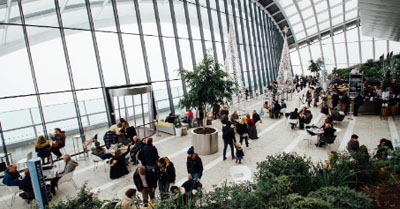Note. You can use this as a standalone lesson or start from page 1.
Modal Verbs and Time of the Action or State
Be careful not to confuse verb tenses and the time of an action or state. A verb tense is the form of the verb used to express the relative time an action or state takes place. For example, should is the past tense of shall, but it can refer to present, past, and future actions or states.
Analyze the time frames should expresses in the following sentences:
1. We should leave now.
2. We should leave at 2 tomorrow.
3. We should have left an hour ago.

RIccardo | Pexels
In the above sentences, should expresses advisability. Although it is the past tense, it expresses advisability in the present, future, and past actions in Sentences 1, 2, and 3.
Sentence 3 also shows an interesting characteristic of modal verbs in that they can be used to express a modality in a particular time frame while the main verb can be in a different time frame. In other words, should itself expresses advisability in the present, but the action itself (leaving) is in the past.
Modals and main verbs in different time frames
Example 1
- You have been working for 10 hours now. You must be tired.
- You worked for 10 hours yesterday. You must have been tired.
In the above sentences, must expresses the idea of a logical conclusion.
In Sentence A, both the modal and the main verb express an idea in the present. The present conclusion is about something that is happening now. (I conclude now that you are probably tired now.)
In Sentence B, the conclusion is in the present, but the state expressed by the main verb is in the past. (I conclude now that you were probably tired then.)
Example 2
- John may come to the party (if he wants).
- John may come to the party tomorrow (I’m not sure).
- John may have come to the party yesterday (I did not see him there).
The modal verb may is in the present tense. It expresses permission in Sentence C but a possibility or likelihood in the other sentences.
In Sentence C, both the permission and the action (coming to the party) are a statement of a present fact.
In Sentence D, the possibility is in the present and refers to an action in the future.
Sentence E means that I think now that it is possible that John came to the party yesterday.
Present and Past Forms of Modal Verbs
Some modal verbs have both present and past forms. As noted in the above section, some of these forms also express different time frames depending on how they are used.
Here are modal verbs in their present and past forms, respectively:
are able to were able to
can could
dare dared
have to had to
may might
must had to
need needed
ought to —
The modal and semi-modal verbs be able to, dare, have to, and need can be conjugated in all verb tenses.
Examples
- I have never been able to understand the difference between “ser” and “estar” in Spanish.
- Professor Ecks’s students did not dare complain about his difficult exams.
- You are going to have to try again tomorrow.
- I have been needing to talk to you for weeks now, but you are never available.
The modal and semi-modal verbs be able to, dare, have to, and need can even be used with other modals.
Examples
- You should not need to beg elected officials to pass legislation that benefits their constituents.
- You arrived early. You must have been able to find an earlier flight home.
- I thought he would have been home by now. He may have had to work late again.
- You should not have dared to be so rude to your boss.
Other Details about Modal Verbs
Continue the lesson for other important details about modal verbs.